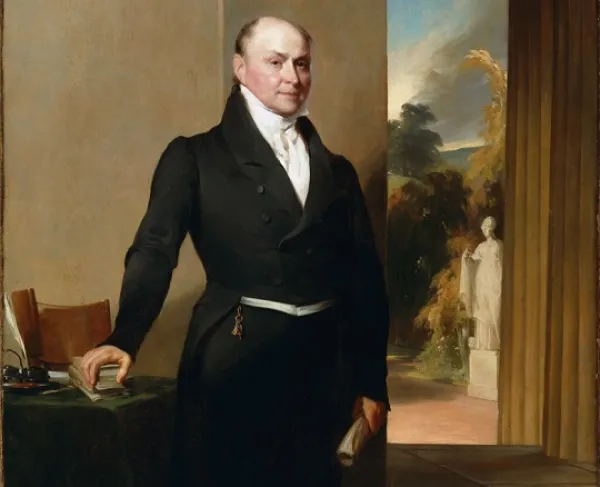John Quincy Adams

Born in 1767 to one of the most consequential early American political families, John Quincy Adams became one of the most controversial Presidents of the first years of American nationhood. He was also a skilled diplomat and Secretary of State, a Senator and a member of the United States House of Representatives.
During the American Revolution, young Adams journeyed to Europe with his father, John Adams, to assist with secretarial work and early diplomacy for the United States. Later returning to North America, John Quincy Adams attended and graduated from Harvard in 1787 and passed the Massachusetts Bar three years later in 1790. He began his political career shortly after being appointed to several key diplomatic posts to represent the United States. His first post was the Prussian capital in Berlin where he remained from 1797 to 1801, followed by an appointment to the Russian court from 1809 to 1814, and finally to Great Britain from 1817 till 1817. Between his first two diplomatic appointments he joined the Massachusetts State Senate in 1802. In 1803, he became one of the two Senators from Massachusetts in Washington DC, and he remained in office until 1808.
When he returned from his time as the Minister to Great Britain, President James Monroe appointed Adams to the cabinet position of Secretary of State. During his time as Secretary of State, Adams played a key part in negotiating for the joint American and British occupation of the Oregon country in the Northwest as well as the transfer of Florida from Spanish to American control under the 1819 Adams-Onis treaty. Both of these treaties held large implications for the future of the country. Adams also influenced the creation of the Monroe Doctrine which continues to shape United States foreign policy.
In accordance with the traditions of the time, Adams was the presumed successor to Monroe as his Secretary of State. This tradition was falling out of favor, however, by the time Adams decided to seek office in 1824 in a race for the Presidency that would be controversial in American history. The race became a four-way political struggle between Adams, Andrew Jackson, William H. Crawford and Henry Clay with no candidate securing the needed majority to become the President. With no candidate able to win the needed votes in the Electoral College, the House of Representatives was forced to decide the election. When the choice was put to the House, Clay through his support and influence ensured the Adams would assume the office of the President. Almost immediately after John Quincy Adams became President, he appointed Henry Clay to be his Secretary of State. Adam’s enemies accused him of corruption and making a secret bargain with Clay for his vital support in the House.
Not one to let accusations get in his way, Adams began an administration hallmarked by ambitious expansion of infrastructure and attempting to grow culture and education in the United States. Despite allegations that he exceeded his executive authority, Adams established scientific expeditions, an observatory and a fund for a national university. He also constructed new roads and canals across that United States and ceremonial broke the ground for the Chesapeake & Ohio (C&O) Canal in 1828.
Despite his herculean efforts to link the states closer together and improve American standing in education, science and culture, Adams went into the 1828 election in a poor position. Andrew Jackson and his supporters accused Adams of corruption and misuse of his authority and drove him from office. Adams returned to his home in Massachusetts for what he hoped and believed would be a quiet retirement. Unexpectedly however, he was elected to the House of Representatives in 1830. He returned to Washington as a congressman and would spend the next 17 years devoting his significant oratory skill and his political influence to causes which he felt merited his passion including the abolition of slavery and stark opposition to the Mexican-American War. During his long tenure in the House of Representatives, he earned the nickname "Old Man Eloquent."
John Quincy Adams remained an impassioned and active member of Congress until his final days. In February 1848, he collapsed from a stroke on the House floor; two days later, he died on February 23, 1848. He was laid to rest in the family burial plot in Quincy, Massachusetts.





